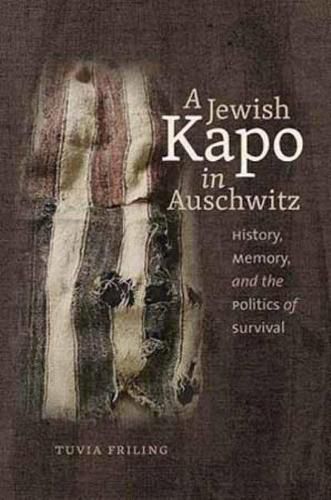Readings Newsletter
Become a Readings Member to make your shopping experience even easier.
Sign in or sign up for free!
You’re not far away from qualifying for FREE standard shipping within Australia
You’ve qualified for FREE standard shipping within Australia
The cart is loading…






Eliezer Gruenbaum (1908-1948) was a Polish Jew denounced for serving as a Kapo while interned at Auschwitz. He was the communist son of Itzhak Gruenbaum, the most prominent secular leader of interwar Polish Jewry who later became the chairman of the Jewish Agency’s Rescue Committee during the Holocaust and Israel’s first minister of the interior. In light of the father’s high placement in both Polish and Israeli politics, the denunciation of the younger Gruenbaum and his suspicious death during the 1948 Arab-Israeli war add intrigue to a controversy that really centers on the question of what constitutes-and how do we evaluate-moral behavior in Auschwitz. Gruenbaum-a Jewish Kapo, a communist, an anti-Zionist, a secularist, and the son of a polarizing Zionist leader-became a symbol exploited by opponents of the movements to which he was linked. Sorting through this Rashomon-like story within the cultural and political contexts in which Gruenbaum operated, Friling illuminates key debates that rent the Jewish community in Europe and Israel from the 1930s to the 1960s.
$9.00 standard shipping within Australia
FREE standard shipping within Australia for orders over $100.00
Express & International shipping calculated at checkout
Eliezer Gruenbaum (1908-1948) was a Polish Jew denounced for serving as a Kapo while interned at Auschwitz. He was the communist son of Itzhak Gruenbaum, the most prominent secular leader of interwar Polish Jewry who later became the chairman of the Jewish Agency’s Rescue Committee during the Holocaust and Israel’s first minister of the interior. In light of the father’s high placement in both Polish and Israeli politics, the denunciation of the younger Gruenbaum and his suspicious death during the 1948 Arab-Israeli war add intrigue to a controversy that really centers on the question of what constitutes-and how do we evaluate-moral behavior in Auschwitz. Gruenbaum-a Jewish Kapo, a communist, an anti-Zionist, a secularist, and the son of a polarizing Zionist leader-became a symbol exploited by opponents of the movements to which he was linked. Sorting through this Rashomon-like story within the cultural and political contexts in which Gruenbaum operated, Friling illuminates key debates that rent the Jewish community in Europe and Israel from the 1930s to the 1960s.